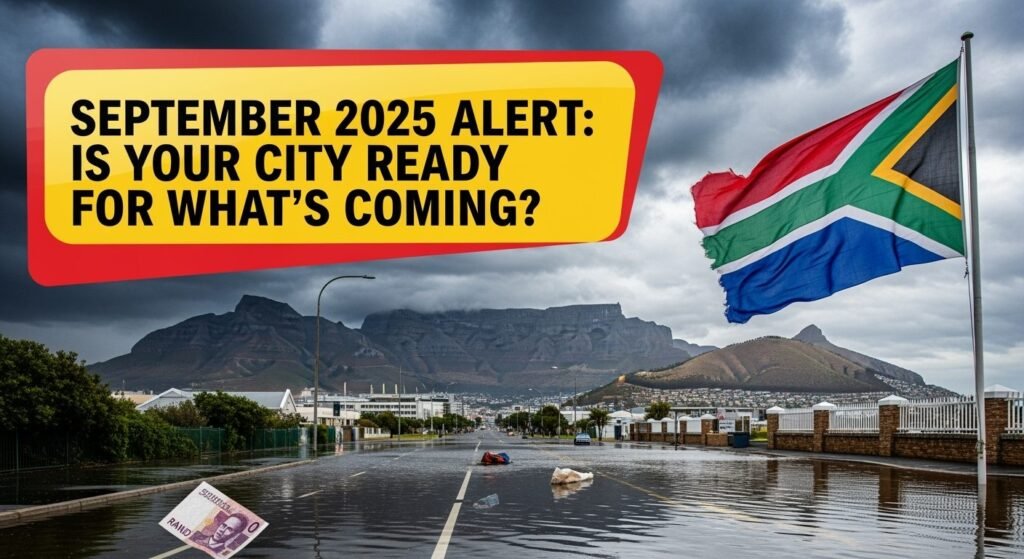South Africa Weather Alerts: As we move into September 2025, I’m watching with growing concern as South African meteorological services issue widespread alerts for severe weather conditions across multiple provinces. The combination of heavy rainfall, strong winds, and potential flooding has prompted authorities to take immediate precautionary measures. If you’re in the affected regions, you’ll need to stay informed and prepared as these weather systems develop. The South Africa September 2025 heavy rain and wind alerts represent one of the most significant weather events for the country this year. Have you prepared your emergency plans yet?

What Regions Are Most Affected
The South Africa September 2025 weather alerts primarily target the eastern and coastal provinces. The Eastern Cape, KwaZulu-Natal, and parts of Mpumalanga are expected to bear the brunt of these severe conditions. Meteorological data indicates rainfall exceeding 100mm in 24-hour periods for some locations, particularly in coastal areas where orographic lifting will enhance precipitation. Urban centers including Durban, East London, and Port Elizabeth face significant risks of flash flooding as drainage systems may become overwhelmed. The South African Weather Service has issued their highest level of warning for these regions, indicating the potential for life-threatening conditions and substantial property damage if preventive actions aren’t taken promptly.
Why This Weather System Is Concerning
What makes this particular weather system especially dangerous is its timing and intensity. September typically marks the transition between seasons in South Africa, but this system shows unusual characteristics. The convergence of a strong cold front with moisture-laden air from the Indian Ocean has created ideal conditions for persistent heavy rainfall. Additionally, the ground in many regions remains saturated from previous rainfall events, significantly increasing flood risks. The wind component adds another layer of danger, with gusts expected to reach 90-110 km/h in coastal areas, potentially damaging infrastructure and creating hazardous conditions for transportation. Climate scientists have noted that the intensity of this system aligns with predictions of more extreme weather events due to climate change patterns affecting the region.
How To Prepare For The Severe Weather
Preparing for these conditions requires immediate action if you’re in the affected areas. First, secure your property by clearing gutters and drains to prevent water buildup. Move valuable items to higher ground if you’re in flood-prone areas. Create an emergency kit containing essential medications, important documents in waterproof containers, non-perishable food, and clean water supplies for at least three days. Charge all communication devices and consider purchasing a power bank or battery-operated radio to stay informed if electricity fails. The South African Disaster Management Centre recommends identifying evacuation routes and emergency shelters in your area before conditions worsen. If you live in areas prone to landslides, particularly on hillsides or near recently burned areas, consider temporary relocation until the weather system passes.
- Clear gutters and secure loose objects around your property
- Prepare emergency supplies including food, water, and medications
- Know your evacuation routes and nearest emergency shelters
- Keep phones charged and have alternative communication methods ready
When Emergency Services Will Be Deployed
The South African National Disaster Management Centre has already begun mobilizing resources in anticipation of the September 2025 weather event. Emergency services are on high alert, with additional personnel and equipment being deployed to high-risk areas. Search and rescue teams have been placed on standby, particularly in regions where flooding is most likely. The South African National Defence Force has also prepared humanitarian assistance teams that can be rapidly deployed if civilian resources become overwhelmed. Power utility Eskom has warned of potential outages and has positioned repair crews strategically throughout the affected regions. If you need emergency assistance during this period, the national emergency number (10111) will remain operational, though authorities caution that response times may be affected by weather conditions.
Real-World Impact: The Cape Town Precedent
In 2023, Cape Town experienced similar weather patterns that resulted in significant flooding. Over 5,000 homes were damaged, and approximately 15,000 people required emergency shelter. The economic impact exceeded R500 million in damages to infrastructure alone. What proved most effective during that crisis was the early warning system and pre-positioning of resources, which significantly reduced potential casualties. The lessons learned from that event have informed much of the current preparation for the September 2025 weather alerts, with improved coordination between weather services, emergency responders, and community organizations being a key focus.






